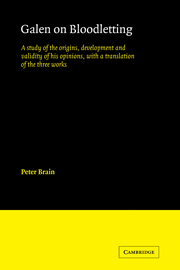 Galen on Bloodletting
Galen on Bloodletting Book contents
- Frontmatter
- Contents
- Preface
- Note on abbreviations and references
- Note on manuscripts and editions
- 1 Galen and his system: an introduction
- 2 Galen's Book on Venesection against Erasistratus (translation)
- 3 Galen's Book on Venesection against the Erasistrateans in Rome (translation)
- 4 Galen's Book on Treatment by Venesection (translation)
- 5 Development of Galen's views and methods as shown in the three works
- 6 Galen, venesection and the Hippocratic Corpus
- 7 Galen's practice of venesection
- 8 Galen's revulsive treatment and vascular anatomy
- 9 The testimony of other writers and the validity of Galen's opinions on sites for venesection
- 10 Galen's use of venesection as an evacuant: can it be justified? A medical digression
- 11 Conclusion
- Glossary
- Works cited
- Index
4 - Galen's Book on Treatment by Venesection (translation)
Published online by Cambridge University Press: 04 August 2010
- Frontmatter
- Contents
- Preface
- Note on abbreviations and references
- Note on manuscripts and editions
- 1 Galen and his system: an introduction
- 2 Galen's Book on Venesection against Erasistratus (translation)
- 3 Galen's Book on Venesection against the Erasistrateans in Rome (translation)
- 4 Galen's Book on Treatment by Venesection (translation)
- 5 Development of Galen's views and methods as shown in the three works
- 6 Galen, venesection and the Hippocratic Corpus
- 7 Galen's practice of venesection
- 8 Galen's revulsive treatment and vascular anatomy
- 9 The testimony of other writers and the validity of Galen's opinions on sites for venesection
- 10 Galen's use of venesection as an evacuant: can it be justified? A medical digression
- 11 Conclusion
- Glossary
- Works cited
- Index
Summary
This is a late work, in which Galen sums up his views on bloodletting at the request of colleagues who wanted something more manageable than his great work On Therapeutic Method.
Those who intend to use phlebotomy must consider first of all how many states of the body there are that call for evacuation. The next question is, which of these states require evacuation by phlebotomy; for there are many conditions, some of which need some other sort of evacuation, and certainly not bloodletting. The third problem is to decide which patients can stand the evacuation without harm, since sometimes the patient's condition demands phlebotomy, yet he cannot bear it either because of his stage of life, or the season of the year, or the nature of the country, or because of some disorder of the mouth of the belly. (This is often miscalled the stomach; in the interests of brevity, however, I shall nevertheless use the term from now on in the whole of this work). There are also some who cannot bear phlebotomy because of their general habit of body, even though by reason of their disease they need it very much. If we are to draw such distinctions, we must consider each occasion on its merits, just as we do with any other remedy. Our next question concerns the veins that are to be opened, since extensive research has been undertaken to decide whether it makes no difference which vein one chooses to cut, all being equally helpful in all conditions, or whether, as Hippocrates and the most celebrated physicians thought, it makes a great deal of difference whether one opens this one rather than that.
- Type
- Chapter
- Information
- Galen on BloodlettingA Study of the Origins, Development and Validity of his Opinions, with a Translation of the Three Works, pp. 67 - 99Publisher: Cambridge University PressPrint publication year: 1986


